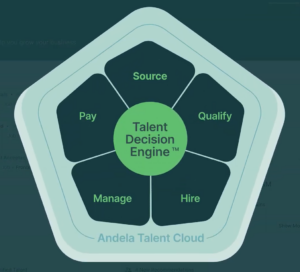
Companies are scrambling to hire people to build generative AI solutions in 2024, as the GenAI hype rocket roars into the stratosphere. But the hiring is hampered by several factors, including the types of GenAI apps companies want to build, the continued shifting of job titles, and sky-high salaries.
Evidence of a surge in GenAI activity seems to be everywhere. O’Reilly recently says it detected a whopping 3,600% increase in interest in GenAI among developers. Deloitte says 79% of businesses are looking to GenAI to drive “substantial organizational transformation” within three years. Meanwhile, McKinsey says companies are increasing AI spending by 40% in response to GenAI.
Having GenAI aspirations is one thing, but actually following through requires having skilled hands on keyboards. Where will companies find all the skilled personnel to build all these GenAI applications? What positions and job titles will correspond with GenAI success? Where can these GenAI unicorns be found? And what skills should individuals learn to prepare themselves for the GenAI job market?
These aren’t easy questions to answer. To get a better idea of what the market is looking for, Datanami talked to Tiago Yuzo Miyaoka at Andela, a company that matches technical talent with companies who want to hire them.
“The terms are really changing,” says Miyaoka, who has a PhD in applied mathematics. “Sometimes, a client comes to us and asks for a GenAI engineer. The other says they want an AI engineer. And another one says they want a machine learning engineer. But if you go to the job description, they’re the same.”
The job board Indeed shows nearly 600 job openings for GenAI engineers at the moment, while a search for AI engineer surfaces nearly 12,000 jobs. There are more than 16,000 jobs returned for “machine learning engineer,” Indeed shows.
Andela gives applicants skills assessments to determine their proficiency in a given area. The folks who pass the assessment, which includes live coding in front of an Andela screener, will earn badges in data science, machine learning engineering, and data engineering. The company currently is working on a badge for prompt engineer, which some surveys show is the most in-demand GenAI job, with an average starting salary of $300,000.
Companies may specify they are looking for a specific position, but the actual job description points to a different position. For instance, Andela might get a request specifically for a prompt engineer, but the job description requires somebody who can also fine tune the AI and also deploy it, Miyaoka says.
“We don’t care much about the name,” he says. “If we find a strong talent in our network that has already been a data scientist, and we have a client who is hiring for a GenAI engineer, we just don’t care. We just make sure that he will be able to fit into the role, and the title is just a small detail.”
In Andela’s hierarchy, data scientists still sit at the top of the data and AI pyramid. A data scientist still signifies somebody who can do the hard work of conducting statistical analysis, building AI models, training the models, and deploying them. “From what we have seen, that’s still the data scientist,” Miyaoka says.
Miyaoka says a large percentage of companies that come to Andela want AI practitioners who are comfortable getting their hands dirty with large language models (LLMs), including fine-tuning them. While it’s easier to get started with pre-built LLMs such as OpenAI’s GPT-4, many companies tapping Andela have plans to build and host their own models, either purchased from the open market or downloaded from open source repositories.
“The main reason why they would want to do that is because of privacy,” Miyaoka says. “They have internal data that they would like to leverage and they’re afraid that data would leak if they use OpenAI APIs, for instance. So they prefer to develop something in house so that they can have more control over it.”
 Data scientists typically will have a degree, preferably a Master’s or higher. However, not all GenAI jobs require degrees, according to Miyaoka.
Data scientists typically will have a degree, preferably a Master’s or higher. However, not all GenAI jobs require degrees, according to Miyaoka.
“In my opinion, you don’t need a degree to be a prompt engineer,” he says. “However, if you want to be a data scientist who also specializes in GenAI, for instance, you would still need that degree. You need all that background.”
Sara Gutierrez, chief science officer at SHL, encourages companies to hire the best talent regardless of degree.
“With the rapidly evolving job market, where technology and industry needs change swiftly, a skills-based hiring approach ensures that organizations can quickly adapt to emerging trends,” Gutierrez says. “By focusing on skills, employers are better equipped to identify candidates with the specific competencies required for the job, fostering a more agile and responsive workforce.”
As labor shortages and skills gaps get bigger, this skills-based approach will become more prevalent, she says. “We’ve seen the private sector increasingly embrace skills-based hiring and there is a growing momentum that suggests more organizations will follow suit,” she says.
This article originally appeared on sister site datanami.





